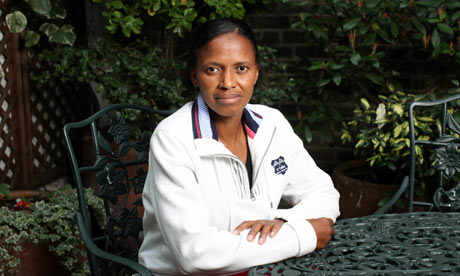
In 1996, Mpho Mbhele was seriously ill, losing weight fast. She had been diagnosed with a sexually transmitted infection, and on visiting her local clinic in South Africa was advised to take an HIV test too.
A fortnight later, she returned for the result. There was a shout across the clinic. "Mpho Mbhele, you have Aids. Go and wait for me in my room." This same nurse told Mbhele there was nothing they could do; that she should go home and wait to die.
Sixteen years later, Mbhele is in London, glowing with health, her story punctuated with bursts of laughter. She is here to talk about her work with mothers2mothers, an organisation dedicated to preventing mother-to-child transmission of HIV. In the US and Europe, this problem barely exists: between them, only one baby a day is born with HIV. But across Africa, that number is 1,000 babies a day.
Last year a UN meeting of world leaders created a global plan to eliminate new HIV infections among children by 2015 – specifically to reduce the number by 90%. With the right treatments this seems surprisingly achievable. Dr Mitch Besser, founder of mothers2mothers, says if a woman is diagnosed with HIV early in pregnancy, has a strong immune system and gets the appropriate treatment, the chances of her baby contracting the virus are only around 2%.
But there are still serious barriers to women receiving proper care. Besser recognised this when he started working in South Africa in 1999. A Harvard-trained obstetrician, he accepted a position at the University of Cape Town at a time before HIV testing and treatments were widely available in the country, and there was still serious denial and stigma around the disease.
Besser soon began questioning how well he was connecting with his patients. "Here's the challenge," he says. "I'm white, I'm American, I speak English, I'm not going to be a mother, and I'm talking to women who have a different culture and are HIV-positive." He also didn't have much time with each patient – certainly not enough to impress upon them exactly when to take complicated drug regimes, or convince them of the need for behavioural changes.
In 2001, he was treating a pregnant woman who was HIV-positive herself, and asked her to come back to help him after she delivered. She began working as a mentor mother, educating other pregnant women about the necessity of an HIV test, and how they should care for themselves and their babies – three more HIV-positive mothers were soon appointed alongside her. Besser secured a grant of $7,000 from the Starr foundation, which paid for the women's stipends, and started to build the programme.
During that same period, Mbhele was struggling with the stigma of her illness. In 1997 she had a child with her husband, and a year later the young family moved away in a horrified rush, after a local woman with HIV was stoned to death. The couple had another child, but split up in 2001.
Soon afterwards, Mbhele realised she was pregnant by her husband again. She was living in Cape Town, and took another HIV test. The HIV-positive result confused her. "In 1996 they told me I had Aids, and an STI, now HIV – three infections. I thought: what am I going to do?"
She was directed to the clinic's mothers2mothers room, where she was educated about her illness, and encouraged to bring her two small children for testing. Thankfully, both were negative.
But Mbhele's baby daughter contracted the virus. She died 11 months later. The outlook for children born with HIV is grim, says Besser; if they don't have treatment, half will die by the age of two.
A mentor mother helped Mbhele cope with her daughter's death, and in 2003 she started working for the programme herself. She is now site coordinator at the Ikhwezi Clinic in Somerset West, near Cape Town.
She encourages pregnant women to have HIV tests, comforts those who have a positive diagnosis, advises them about treatment, helps disclose their illness to their families, and provides an uplifting example. She soon realised how important it was for her to take her antiretrovirals at work, she says, so that any sceptical patients could see that she was being given exactly the same drugs as them, and was fit and healthy as a result.
Mothers2mothers now operates in seven African countries, reaching 242,000 new pregnant women and mothers with HIV last year, says Besser, and there are hopes that it will expand further. The organisation's emphasis has so far been on delivering services themselves but, rather than creating a parallel system, the next step is to advise and help governments which want to take up the mentor-mother idea and make it a key part of its health services.
A recent article in the British Medical Journal noted that there hasn't yet been a major assessment of the programme's effectiveness in reducing mother-to-child transmission of HIV, work that clearly needs to be done. But locally at least, the results seem impressive. Mbhele says the manager at her clinic told her that the year before the programme started, they had 150 babies test HIV-positive. The year afterwards they had four. "In 1996, when I was told I had Aids, I was scared," she says. "I was told: you're going to die, nothing else, until I discovered mothers2mothers."
She smiles at her relative good fortune, and strides off to explore the city.

